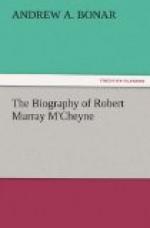In his brief diary he records, on December 3, that twenty anxious souls had that night been conversing with him; “many of them very deeply interesting.” He occasionally fixed an evening for the purpose of meeting with those who were awakened; and in one of his note-books there are at least four hundred visits recorded, made to him by inquiring souls, in the course of that and the following years. He observed, that those who had been believers formerly had got their hearts enlarged, and were greatly established; and some seemed able to feed upon the truth in a new manner,—as when one related to him how there had for some time appeared a glory in the reading of the word in public, quite different from reading it alone.
At the same time he saw backslidings, both among those whom believers had considered really converted, and among those who had been deeply convicted, though never reckoned among the really saved. He notes in his book: “Called to see ——. Poor lad, he seems to have gone back from Christ, led away by evil company. And yet I felt sure of him at one time. What blind creatures ministers are! man looketh at the outward appearance.” One morning he was visited by one of his flock, proposing “a concert for prayer on the following Monday, in behalf of those who had fallen back, that God’s Spirit might re-awaken them,”—so observant were the believers as well as their pastor of declensions. Among those who were awakened, but never truly converted, he mentions one case. “Jan. 9, 1840.—Met with the case of one who had been frightened during the late work, so that her bodily health was injured. She seems to have no care now about her soul. It has only filled her mouth with evil-speaking.”
That many, who promised fair, drew back and walked no more with Jesus, is true. Out of about 800 souls who, during the months of the Revival, conversed with different ministers in apparent anxiety, no wonder surely if many proved to have been impressed only for a time. President Edwards considered it likely that, in such cases, the proportion of real conversions might resemble the proportion of blossoms in spring, and fruit in autumn. Nor can anything be more unreasonable than to doubt the truth of all, because of the deceit of some. The world itself does not so act in judging of its own. The world reckons upon the possibility of being mistaken in many cases, and yet does not cease to believe that there is honesty and truth to be found. One of themselves, a poet of their own, has said with no less justice than beauty—
“Angels
are bright still, though the brightest fell;
And though foul
things put on the brows of grace,
Yet grace must
still look so.”




